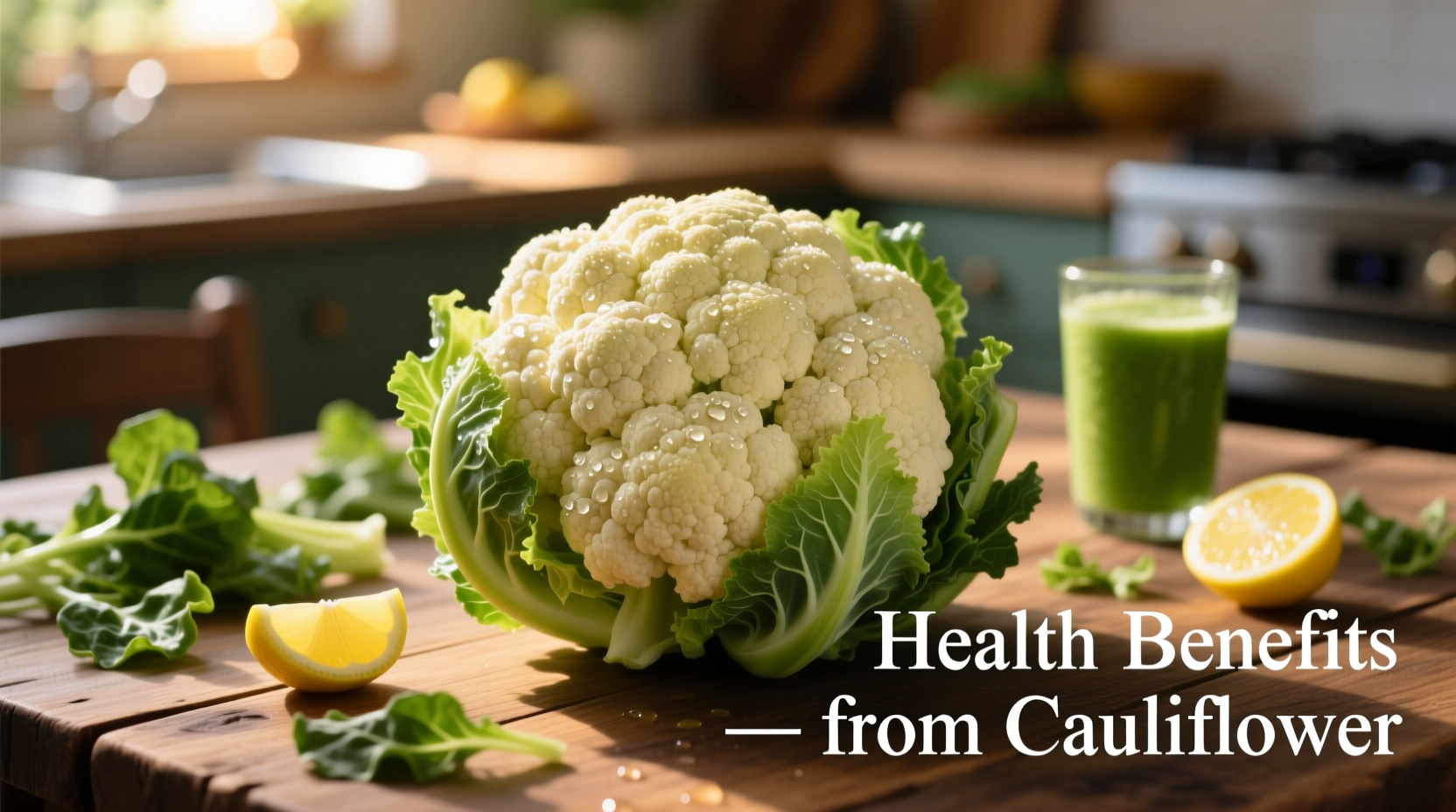Once considered merely a bland side dish, cauliflower has emerged as a nutritional powerhouse with science-backed health advantages that extend far beyond its humble appearance. This cruciferous vegetable contains unique phytochemicals like sulforaphane and indole-3-carbinol that activate the body's natural detoxification systems while protecting cells from damage. Researchers at Harvard Medical School have documented how regular consumption of cruciferous vegetables correlates with significantly lower risks of several chronic diseases.

Nutritional Profile That Sets Cauliflower Apart
Understanding cauliflower's health benefits starts with examining its impressive nutritional composition. A single one-cup serving (100g) of raw cauliflower contains:
| Nutrient | Amount per Serving | Daily Value % |
|---|---|---|
| Calories | 25 | 1% |
| Vitamin C | 48.2mg | 77% |
| Vitamin K | 15.5mcg | 20% |
| Folate | 57mcg | 14% |
| Fiber | 2g | 8% |
| Potassium | 299mg | 9% |
Unlike many vegetables, cauliflower maintains most of its nutritional value whether eaten raw or cooked, though steaming preserves more antioxidants than boiling according to research published in the Journal of Agricultural and Food Chemistry. The vegetable's white color comes from anthoxanthins, flavonoids with demonstrated anti-inflammatory properties.
Science-Backed Health Benefits You Can't Ignore
Cancer Risk Reduction Through Unique Compounds
Cauliflower contains glucosinolates that convert to isothiocyanates during chewing and digestion. These compounds, particularly sulforaphane, have demonstrated potent anti-cancer effects in numerous studies. Research from the American Institute for Cancer Research shows these compounds help eliminate carcinogens, reduce inflammation, and inhibit tumor growth. Population studies indicate regular cruciferous vegetable consumption correlates with 15-20% lower risk of certain cancers, particularly prostate, breast, and colorectal cancers.
Heart Health Protection Mechanisms
The combination of fiber, potassium, and choline in cauliflower creates multiple pathways for cardiovascular protection. The fiber helps regulate cholesterol levels by binding to bile acids, while potassium counteracts sodium's effects to maintain healthy blood pressure. A 2022 study in Circulation found that people consuming at least 3 servings of cruciferous vegetables weekly had 16% lower risk of cardiovascular disease compared to those eating less than one serving.
Digestive System Support
With 2 grams of fiber per cup and significant glucosinolate content, cauliflower promotes digestive health through multiple mechanisms. The fiber adds bulk to stool while feeding beneficial gut bacteria, and the glucosinolates help maintain the intestinal lining's integrity. According to the International Scientific Association for Probiotics and Prebiotics, cruciferous vegetables like cauliflower function as prebiotics that enhance microbial diversity in the gut microbiome.
Cauliflower Compared to Other Cruciferous Vegetables
While all cruciferous vegetables offer health benefits, cauliflower has unique advantages worth considering:
| Nutrient | Cauliflower | Broccoli | Kale | Brussels Sprouts |
|---|---|---|---|---|
| Vitamin C (per 100g) | 48.2mg | 89.2mg | 120mg | 85mg |
| Vitamin K (per 100g) | 15.5mcg | 101.6mcg | 704.8mcg | 177mcg |
| Fiber (per 100g) | 2g | 2.6g | 2g | 3.8g |
| Calories (per 100g) | 25 | 55 | 49 | 43 |
| Unique Compounds | I3C, sulforaphane | Sulforaphane | Lutein, zeaxanthin | Glucosinolates |
Source: USDA FoodData Central, 2023
Practical Ways to Maximize Health Benefits
Optimal Preparation Methods
How you prepare cauliflower significantly impacts its nutritional value. Research from the University of Illinois demonstrates that chopping cauliflower and waiting 40 minutes before cooking allows myrosinase enzymes to fully activate the beneficial compounds. Steaming for 5-7 minutes preserves more nutrients than boiling, while roasting at high temperatures (400°F/200°C) enhances certain antioxidants. Avoid overcooking, which can destroy heat-sensitive nutrients like vitamin C.
Daily Incorporation Strategies
You don't need to eat plain cauliflower to reap its benefits. Try these practical approaches:
- Replace half your mashed potatoes with steamed cauliflower for added nutrients
- Create "cauliflower rice" by pulsing florets in a food processor
- Add raw cauliflower florets to salads for crunch and nutrition
- Make cauliflower crust pizza for a lower-carb alternative
- Blend cooked cauliflower into soups for creaminess without dairy
Important Considerations and Limitations
While cauliflower offers numerous health benefits, certain considerations apply to specific populations:
Digestive Sensitivity
The high fiber and raffinose content in cauliflower can cause gas and bloating in some individuals, particularly those with irritable bowel syndrome (IBS). The Monash University Low FODMAP Diet guidelines recommend limiting cauliflower to 1/4 cup portions for those following a low-FODMAP diet during elimination phases.
Thyroid Function Considerations
Cauliflower contains goitrogens that may interfere with thyroid function when consumed in extremely large quantities. However, the National Institutes of Health states that normal dietary consumption poses no risk to individuals with healthy thyroid function. Those with existing thyroid conditions should consult their healthcare provider about appropriate intake levels.
Medication Interactions
The vitamin K content in cauliflower could potentially interact with blood-thinning medications like warfarin. Patients on these medications should maintain consistent vitamin K intake rather than eliminating cruciferous vegetables entirely, as recommended by the American Heart Association.
Evolution of Scientific Understanding
Research on cauliflower's health benefits has evolved significantly over the past three decades:
| Time Period | Key Discoveries | Research Impact |
|---|---|---|
| 1990-2000 | Identification of glucosinolates as cancer-protective compounds | Initial recognition of cruciferous vegetables' health potential |
| 2001-2010 | Discovery of sulforaphane's mechanism for activating detoxification enzymes | Understanding of specific biochemical pathways |
| 2011-2020 | Documentation of epigenetic effects and gut microbiome interactions | Broader understanding of long-term health impacts |
| 2021-Present | Personalized nutrition research showing genetic variations in response to cruciferous compounds | Tailored dietary recommendations based on individual biology |
Source: National Center for Biotechnology Information literature review, 2023
Conclusion: Making Cauliflower Work for Your Health
Cauliflower's impressive nutritional profile and science-backed health benefits make it a valuable addition to most diets. By understanding how to prepare it properly and incorporating it consistently through creative culinary approaches, you can harness its cancer-protective, heart-healthy, and digestion-supporting properties. While certain populations should consider specific limitations, for most people, increasing cauliflower consumption represents a simple, evidence-based strategy for enhancing long-term health outcomes.











 浙公网安备
33010002000092号
浙公网安备
33010002000092号 浙B2-20120091-4
浙B2-20120091-4